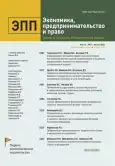Application of public-private partnership in information and financial relations of participants of the tax system
- Authors: Buletova N.E.1, Chigarov V.V.2
-
Affiliations:
- The Russian Presidential Academy of National Economy and Public Administration
- Volgograd Institute (branch) of PRUE
- Issue: Vol 13, No 8 (2023)
- Pages: 2491-2502
- Section: Articles
- URL: https://journals.eco-vector.com/2222-534X/article/view/607699
- DOI: https://doi.org/10.18334/epp.13.8.118831
- ID: 607699
Cite item
Abstract
This study is aimed at solving the problem of accessibility of the latest information technology for the state, which allow achieving high quality implementation of public services and expanding the opportunities for private investments in the non-profit sector. The authors obtained results aimed at developing the theory of public-private partnership in the digital economy. The features of the application of public-private partnership in the information sphere are determined. The risks of developing and implementing public-private partnership projects in the information sphere are detailed. The results of a comparative analysis of the public-private partnership agreement and the concession agreement to determine acceptable conditions for information partnership in tax relations are presented. The authors' model of public-private information and financial partnership is presented. The results obtained will be of interest to the scientific community for consideration in new research on solving the problems of digital transformation of the tax system through public-private partnership, as well as to the parties of such partnership for the formation of an effective model of interaction on terms of equality and consideration of mutual interests.
About the authors
Natalya Evgenevna Buletova
The Russian Presidential Academy of National Economy and Public Administration
Email: buletovanata@gmail.com
Vladislav Vladimirovich Chigarov
Volgograd Institute (branch) of PRUE
Email: chigarov-vlad@mail.ru
References
- Зотиков Н.З. Контрагент – надежный партнер или источник налогового риска // Вестник Евразийской науки. – 2021. – № 1.
- Иванова Т. Н., Иванов Д. В. Классический и гибкие подходы к управлению проектами // Бюллетень науки и практики. – 2019. – № 10. – c. 168-175. – doi: 10.33619/2414-2948/47/21.
- Кирова Е.А., Морозова Н.Г., Безверхий А.С. Трансформация налоговой системы России в условиях становления цифровой экономики // Вестник университета. – 2019. – № 7. – c. 118-124. – doi: 10.26425/1816-4277-2019-7-118-124.
- Gonzalo J. Garateguy, Gonzalo R. Arce, Daniel L. Lau, Ofelia P. Villarreal QR images: optimized image embedding in QR codes // IEEE Trans Image Process. – 2014. – № 23(7). – p. 2842-2853. – doi: 10.1109/TIP.2014.2321501.
- Jiangyu Huang, Kezhen Liu Research on Tax Planning of PPP Projects in China: Based on the Perspective of Digital Economy // Journal of Finance Research. – 2020. – № 04(2). – p. 128-134. – doi: 10.26549/jfr.v4i2.5509.
- Методика оценки эффективности проекта ГЧП, проекта МЧП и определения их сравнительного преимущества (утв. Приказом Минэкономразвития РФ от 30.11.2015г. №894). [Электронный ресурс]. URL: https://docs.cntd.ru/document/420321343 (дата обращения: 27.06.2023).
- Руководство по реализации проектов государственно-частного партнерства. Лучшие практики. [Электронный ресурс]. URL: https://www.economy.gov.ru/material/file/cd482f73c03b658fa97a2d844c7e39d9/metodic2018.pdf (дата обращения: 25.06.2023).
- Ткаченко М. Оценка эффективности и обоснование сравнительного преимущества проектов ГЧП. Национальный центр ГЧП. [Электронный ресурс]. URL: https://rosinfra.ru/pdf/Презентация%20об%20оценке%20эффективности%20и%20обоснования%20сравнительного%20преимущества%20проектов%20ГЧП%20в%20рамках%20224-ФЗ.pdf (дата обращения: 25.06.2023).
- Основные тренды и статистика рынка ГЧП по итогам 2022 года: аналитический дайджест. [Электронный ресурс]. URL: https://pppcenter.ru/analitika/ (дата обращения: 27.06.2023).
- ГЧП в IT: новые возможности. Фонд развития интернет-инициатив. 2018. [Электронный ресурс]. URL: https://www.iidf.ru/upload/images_articles/Сoncession_IT_iidf_ppu.pdf (дата обращения: 27.06.2023).
- Приказ ФНС России от 05.03.2021г. №ЕД-7-1/173@ «Об утверждении Стратегической карты ФНС России на 2021 - 2023 годы». [Электронный ресурс]. URL: https://www.consultant.ru/document/cons_doc_LAW_380874/2ff7a8c72de3994f30496a0ccbb1ddafdaddf518/ (дата обращения: 25.06.2023).
- Сафонов А. Деловое совершенство: приоритеты менеджмента в турбулентное время // Business Excellence. – 2022. – № 9. – c. 44-51.
- Стремление к совершенству. Информационная брошюра. Всероссийская организация качества. [Электронный ресурс]. URL: https://efqm-rus.ru/docs/c2e/C2E-Inf-Broch_-rus-2013.pdf (дата обращения: 25.06.2023).
- ГЧП в ИТ: инструкция по применению. Как запускать федеральные и региональные проекты ГЧП в ИТ. Практические рекомендации и материалы. Москва, 2021. [Электронный ресурс]. URL: https://www.escorussia.ru/media/redactor/ГЧП%20в%20ИТ.pdf (дата обращения: 27.06.2023).
Supplementary files








